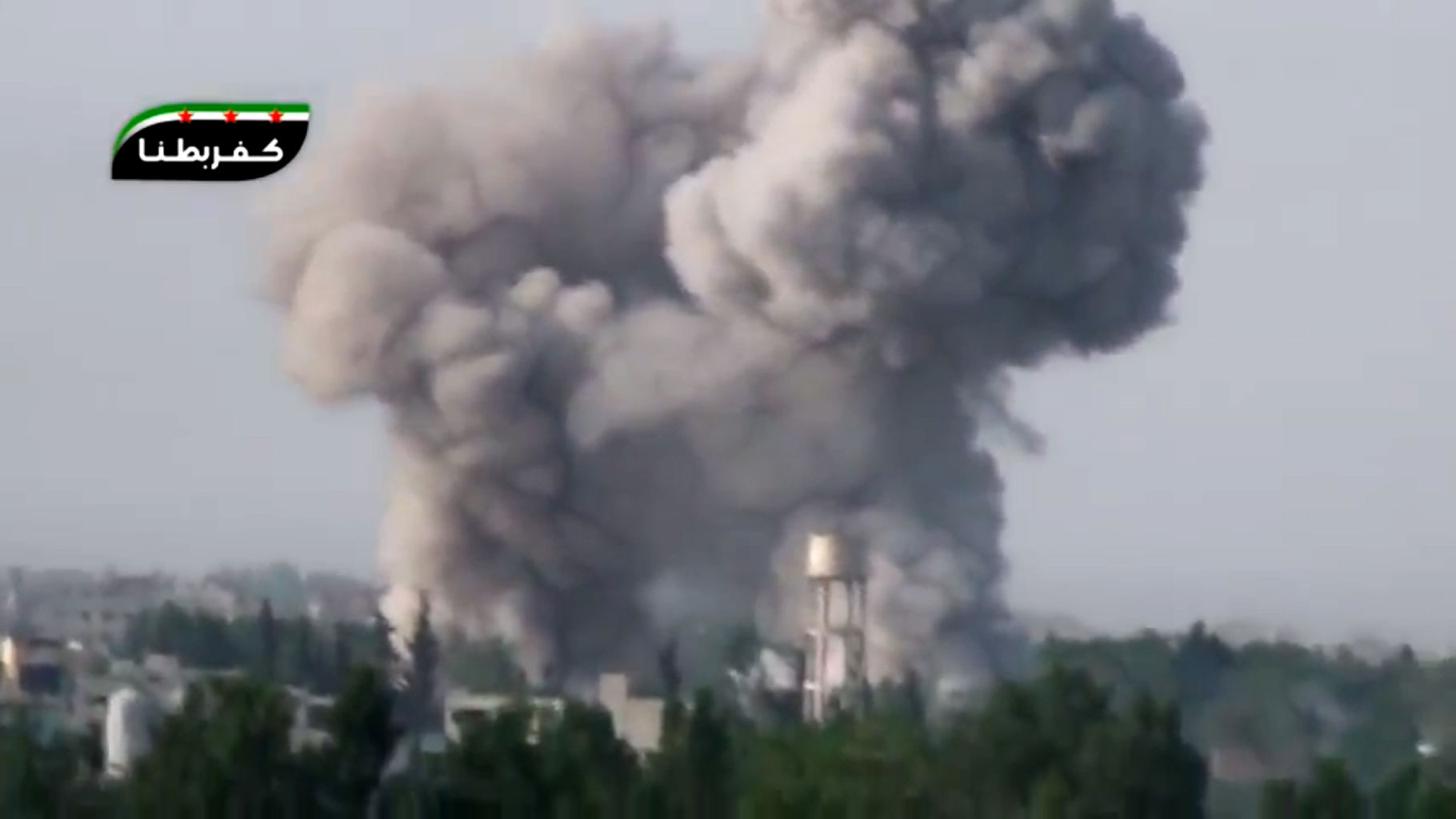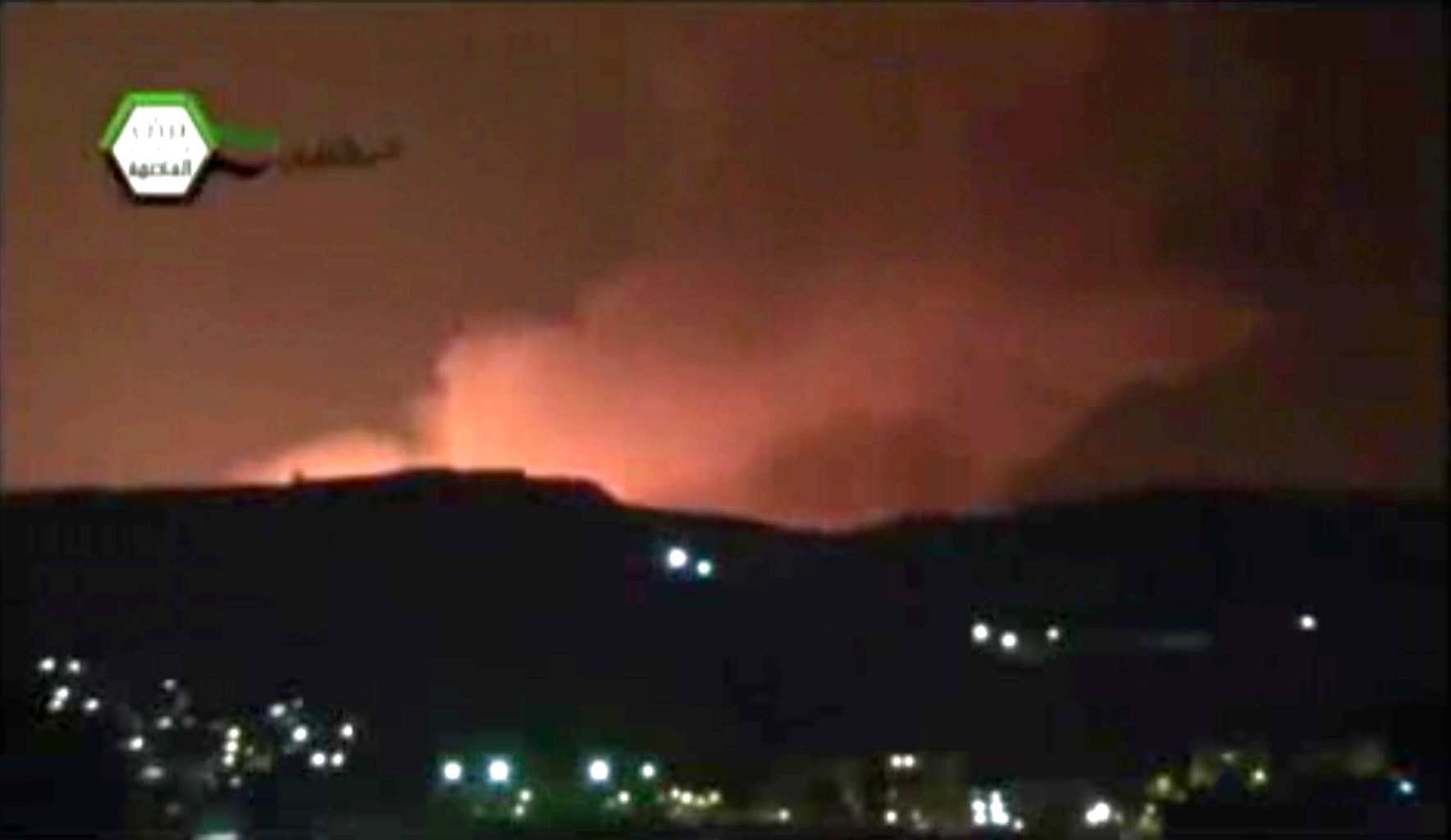BEIRUT (AP) — Israeli warplanes struck areas in and around the Syrian capital Sunday, setting off a series of explosions as they targeted a shipment of highly accurate, Iranian-made guided missiles believed to be bound for Lebanon's Hezbollah militant group, officials and activists said.
The attack, the second in three days and the third this year, signaled a sharp escalation of Israel's involvement in Syria's bloody civil war. Syrian state media reported that Israeli missiles struck a military and scientific research center near Damascus and caused casualties.
Syria's government called the attacks against against its territory a "flagrant violation of international law" that have made the Middle East "more dangerous."
Information Minister Omran al-Zoubi, who read a Cabinet statement to reporters Sunday in Damascus following an emergency government meeting, claimed the Israeli strikes are evidence of the Jewish state's links with Islamic extremist groups trying to overthrow President Bashar Assad's regime.
He added that Syria has the right and the duty "to defend its people by all available means."
While the government tried to use the airstrikes to taint the rebels by linking them to Israel, Syria's arch rival, the attacks still pose a dilemma for an Assad regime already battling a relentless rebellion at home. If it fails to respond, it looks weak and opens the door to such airstrikes becoming a common occurrence. But any military retaliation against Israel would risk dragging the Jewish state and its powerful army into a broader conflict.
The tempo of the new strikes added a dangerous dynamic to the conflict, fueling concerns that events could spin out of control and spark a regional crisis.
Israel's military on Sunday deployed two batteries of its Iron Dome rocket defense system to the north of the country. It described the move as part of "ongoing situational assessments."
A senior Israeli official, who spoke on condition of anonymity in order to disclose information about a secret military operation to the media, confirmed that Israel launched an airstrike in the Syrian capital early Sunday but did not give more precise details about the location. The target was Fateh-110 missiles, which have precision guidance systems with better aim than anything Hezbollah is known to have in its arsenal, the official told The Associated Press.
The airstrikes come as Washington considers how to respond to indications that the Syrian regime may have used chemical weapons in its civil war. President Barack Obama has described the use of such weapons as a "red line," and the administration is weighing its options - including possible military action.
Iran, a close ally of the Assad regime, condemned the airstrikes, and a senior official hinted at a possible response not from Terhan, but rather Hezbollah.
Gen. Masoud Jazayeri, assistant to the Iranian chief-of-staff, told Iran's state-run Arabic-language Al-Alam TV that Tehran "will not allow the enemy (Israel) to harm the security of the region." He added that "the resistance will retaliate to the Israeli aggression against Syria."
Israel has said it wants to stay out of the Syrian war, but Prime Minister Benjamin Netanyahu has repeatedly stated the Jewish state would be prepared to take military action to prevent sophisticated weapons from flowing from Syria to Hezbollah or other extremist groups.
Israel and Hezbollah fought a monthlong war in mid-2006. The militant group fired thousands of rockets at Israel, while Israeli warplanes destroyed large areas of southern and eastern Lebanon during a conflict that ended in stalemate.
Earlier this year, the Iron Dome system was credited with shooting down hundreds of rockets during a round of fighting against Hamas militants in the Gaza Strip.
Israel is especially concerned that Hezbollah will take advantage of the chaos in neighboring Syria and try to smuggle advanced weapons into Lebanon. These include anti-aircraft missiles, which could hamper Israel's ability to operate in Lebanese skies, and advanced Yakhont missiles that are used to attack naval ships from the coast.
Syria's state news agency reported explosions at the Jamraya military and scientific research center near Damascus and said initial reports indicate they were the "result of Israeli missiles." It said there were casualties but did not give a number.
Damascus-based activist Maath al-Shami said the strikes occurred around 3 a.m. "Damascus shook. The explosion was very, very strong," said al-Shami adding that one of the attacks occurred near the capital's Qasioun mountain that overlooks Damascus.
He said the raid targeted a military position for the elite Republican Guards that is in charge of protecting Damascus, Assad's seat of power.
Mohammed Saeed, another activist who lives in the Damascus suburb of Douma, said "the explosions were so strong that earth shook under us." He said the smell of the fire caused by the air raid near Qasioun was noticeable miles away.
Israeli media reported that Netanyahu also was holding an emergency meeting of his inner Security Cabinet. The prime minister's office declined comment.
Amos Yadlin, a former head of Israel's military intelligence, said the strikes on Syria are a signal to Damascus' ally, Tehran, that Israel is serious about the red lines it has set.
"Syria is a very important part in the front that Iran has built. Iran is testing Israel and the U.S. determination in the facing of red lines and what it sees is in clarifies to it that at least some of the players, when they define red lines and they are crossed, take it seriously," he told Army Radio.
Like the Syrian regime, Iran also portrayed the strike as evidence of collusion between Israel and Syria's rebels.
Iranian defense minister Gen. Ahmad Vahidi was quoted by the official IRNA news agency as saying the attacks show a growing alliance of convenience between the Syrian opposition and Israel.
"These vain moves are not a sign of Israel's power," he said. "It rather shows the (Israeli) regime's despair in the face of regional developments."
Iran has provided both financial and military support to Hezbollah for decades, and has used Syria as a conduit for both. If Assad were to fall, that pipeline could be cut, dealing a serious blow to Hezbollah's ability to confront Israel.
The Fateh-110, or "Conqueror" in Farsi, is a short-range ballistic missile developed by Iran and first put into service in 2002. The Islamic Republic unveiled an upgraded version in 2012 that improved the weapon's accuracy and increased its range to 300 kilometers (185 miles).
Vahidi said at the time that the solid-fueled missile could strike with pinpoint precision, making it the most accurate weapon of its kind in Iran's arsenal.
An Israeli airstrike in January also targeted weapons apparently bound for Hezbollah, Israeli and U.S. officials have said. The White House had no immediate comment on Sunday's reported missile strikes.
The Britain-based Syrian Observatory for Human Rights, an activist group, also reported large explosions in the area of Jamraya, a military and scientific research facility northwest of Damascus, about 15 kilometers (10 miles) from the Lebanese border.
Hezbollah's Al-Manar TV said the research center in Jamraya was not hit, but instead an army supply facility that produced food products for the military. It quoted unnamed Syrian security officials as saying that three sites including military barracks, arms depots and air defense center were targeted by the strike.
The station aired footage of what it said was the Jamraya facility hit in the strike. It showed a heavily damaged building as well as what appeared to be a chicken farm with some chickens pecking around in debris scattered with dead birds.
The raid appeared to have taken place next to a major road that was filled with debris, and shell casings were strewn on the ground. A blue street sign on the side of the road referred to the direction of the Lebanon border and the Syrian town of Zabadani near the frontier.
Lebanon's Al-Mayadeen TV, which has several reporters around Syria, said one of the strikes targeted a military position in the village of Saboura, west of Damascus and about 10 kilometers (six miles) from the Lebanon border.
An amateur video said to be shot early Sunday in the Damascus area showed fire lighting up the night sky. The video appeared genuine and corresponded to other AP reporting.
Uzi Rubin, a missile expert and former Defense Ministry official, told the AP that if the target were Fateh-110 missiles as reported then it is a game changer as they put almost all Israel in range and can accurately hit targets.
Rubin emphasized that he was speaking as a rocket expert and had no details on reported strikes.
"If fired from southern Lebanon they can reach Tel Aviv and even (the southern city of) Beersheba." He said the rockets are much five times more accurate than the scud missiles that Hezbollah has fired in the past. "It is a game changer because they are a threat to Israel's infrastructure and military installations," he said.
Israel's first airstrike in Syria, in January, also struck Jamraya. U.S. officials said it targeted trucks next to the research center that carried SA-17 anti-aircraft missiles.


